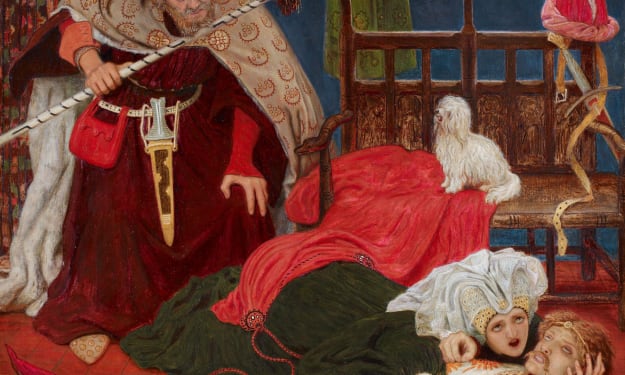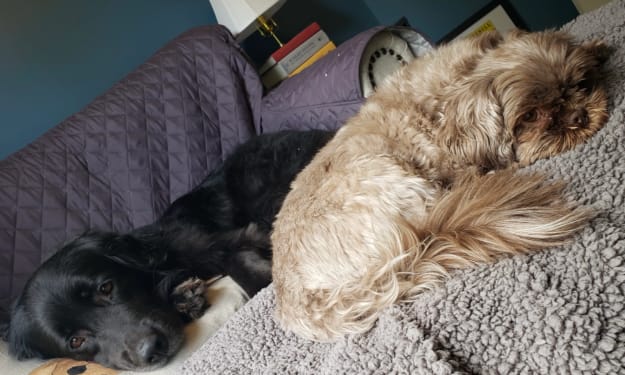Woody Allen’s Vision of Death
Or How to Philosophize With a Feather

Because I could not stop for death —
He kindly stopped for me —
Emily Dickinson
There are those who are dead set against death, those who accept it, those who pretend to bear it, and those who perceive it with an ironic inclination, for death is eminently imminent, terribly terrifying, the end of life, and most of all, extremely reliable. Woody Allen seems to adhere to all categories of people and their understandings of death. His vision of it is very often comically ambiguous, which seems to indicate that he is hiding or trying to hide his true feelings towards death. When this unavoidable reality, this final cut, appears as a joke for the sake of a laugh, or in some philosophical observation, one has to wonder about the real meaning of it all. “Death, sweet death! I await you with a smile,” said an anonymous poet. Allen, time and again, seems to say: Death, bitter death! Don’t bother with me! Unfortunately — fortunately for some — death always comes for us. Only, it is deplorable that it befalls us at times when we least expect it to, or when we yet don’t really want it to. What can we do? C’est la vie. The saying “In God we trust” should read: In death we trust. I think it is time to begin probing Allen’s works for death signals.
Getting Even
In My Philosophy, the fourth story of his first book, Getting Even, Allen expresses his desire for near immortality:
I had completed the philosophical work that I am hoping will not be uncovered until after my death, or until the year 3000 (whichever comes first), and which I modestly believe will assure me a place of reverence among history’s weightiest thinkers. (28)
Wishing to beat Methuselah in long life and become one of the venerated eggheads brings on a chuckle and even a laugh, but it might point to an unsubdued fear of death. However, if one could live till the year 3000, one will not need to be a great sage in order to be esteemed. A thousand years is a long time; many of us would settle for a hundred. Further on, Allen states: “It is impossible to experience one’s own death objectively and still carry a tune” (32). I heard of a goofy singer who died electrocuted in his bathtub while he was singing a lullaby. Of course, I don’t think that he was openminded while undergoing his death. Can one smile and at the same time ponder about his or her own death? Allen seems to do so, and so may a multitude of people, but I very much doubt it. He ends the death topic of the chapter with: “Eternal nothingness is O.K. if you’re dressed for it” (33). This remark may bear a few interpretations: (1) Death is acceptable if it nabs you while you are fully dressed or at least not naked; (2) Death is fair if it warns you before it strikes, giving you time to dress up for it; (3) Infinite void is godlike if you are dressed to survive it forever. I think that Allen had this last interpretation in mind, or the first one.
In Death Knocks, a play which constitutes the sixth segment of Getting Even, death is personified as a middle-aged, pale-faced man dressed in black who comes for Nat Ackerman through the window and almost breaks his neck falling on the floor. Nat does not understand where Death wants to take him to, but soon enough, Death supplies him with an enigmatic answer: “Death. It. The Thing. The Happy Hunting Grounds” (44). Death is suddenly an entity and a joyous shooting terra, but from the moment of his arrival to the end of the play, Death, the man, appears as a schnook, a schmuck, a schlemiel, a schnorrer, a dimwit, a dunce, a numskull, and an oaf. After long insistence and persistence from Nat, Death agrees to join him in a game of gin rummy, where if Nat wins, he gets an extra day on Earth, but if Death wins, Nat has to go tout de suite (right away). Death even needs refreshments: “Get the cards and give me a Fresca and put out something. For God’s sake, a stranger drops in, you don’t have potato chips or pretzels” (46).
But cheap Nat wants to raise the stakes: “You want to play a tenth of a cent a point to make it interesting?” (46), getting an appropriate reply: “It’s not interesting enough for you?” (46).
But Nat plays better when money is involved. Death calls Nat, Newt, and complains about a headache. During the play, Nat inquires about death and the afterlife, and gets a blunt answer: “To tell you the truth, you fall in a crumpled heap on the floor.” (48)
Nat argues about this verity; he wants to fall over a sofa. Death’s refusal to concur triggers Nat to say that he reminds him of Moe Lefkowitz because both are obstinate. Death replies revealingly: “I remind him of Moe Lefkowitz. I’m one of the most terrifying figures you could possibly imagine, and him I remind of Moe Lefkowitz. What is he, a furrier?” (49).
Death is now seen as something or someone you lose your skin to, a merciless hunter. Nat then admits that he is not happy with Death’s appearance, since he looks like him, and Death feels insulted. They continue to play and Nat wins. Death tries to get out of the deal but to no avail, and when he asks Nat what he could do for 24 hours, Nat responds: “Check into a hotel and go to a movie. Take a schvitz. Don’t make a federal case… Plus you owe me twenty-five dollars” (52).
Lacking the money, since the little he has is for gas and tolls, Death wants a rematch the next day, and admits to be a schmo: “I couldn’t just take him and go. I had to get involved in rummy” (53). Death, leaving through the stairs this time, falls down even after being warned by Nat to watch for the loose rug. The play ends with Nat calling Moe: “Listen, I don’t know if someone’s playing a joke, or what, but Death was just here. We played a little gin… No, Death. In person. Or somebody who claims to be Death. But, Moe, he’s such a schlep!” (53).
By beating Death, Nat wins a day of life, but from what we have seen of Death, Nat could live till he is too old to play. Death proves to be quite ridiculous, exceptionally naive, and a blabbermouth. Yet at times, especially when food is concerned, he reveals a touch of chutzpah. Still, on the whole, Death is a lost case, lacking the characteristics mostly attributed to him. Allen postpones the inevitable, puts it on hold, and even hurts it. It is quite funny to imagine death being grieved. Death is humanized — it is easier to deal with someone you can see than to grope with something obscure.
Without Feathers
Selections from the Allen Notebooks, the first part of his second book, Without Feathers, begins with an epigraph that deals with death: “Following are excerpts from the hitherto secret journal of Woody Allen, which will be published posthumously or after his death, whichever comes first” (3). This double joke is doubly funny. Allen is alive and the publication of his journal is a fait accompli (and posthumous already means after death). If one is immortal, there is no after death, and perhaps it is what Allen is alluding to. The next paragraph is noteworthy:
Once again I tried committing suicide — this time by wetting my nose and inserting it into the light socket. Unfortunately, there was a short in the wiring, and I merely caromed off the icebox. Still obsessed by thoughts of death, I brood constantly. I keep wondering if there is an afterlife, and if there is will they be able to break a twenty? (4)
Although the suicide attempt is ludicrous, it is still a shot at death. It reminds me of a story about a fellow who decided to commit suicide by swallowing a large quantity of aspirin. It seems that after the ninth or tenth pill, he felt much better (though an hour later, he surely had quite an indigestion). The obsession with death and small change in the event of an afterlife, denotes anxiety about the former but some skepticism about the latter. Death seems to suggest a dreaded oblivion. Yet suicide persists:
Today I saw a red-and-yellow sunset and thought, How insignificant I am! Of course, I thought that yesterday, too, and it rained. I was overcome with self-loathing and contemplated suicide again — this time by inhaling next to an insurance salesman. (5)
Here, suicide is triggered by an acute sense of helplessness and a low self-esteem. Suicide is quite contrary to death. One actually chooses to die, unafraid of it, not caring to live anymore. Nevertheless, doing it by breathing the same air as an insurance salesman parodies the act tremendously. Death continues to surface:
While taking a noon walk today, I had more morbid thoughts. What is it about death that bothers me so much? Probably the hours. Melnick says the soul is immortal and lives on after the body drops away, but if my soul exists without my body I am convinced all my clothes will be too loose-fitting. Oh, well…. (6)
Allen admits that thoughts about death are gloomy, and even tries to reason about their recurrence. Yet his response to his endless questioning is illusive. For him, the only satisfactory time for dying is probably during sleep, but I think that even slumbering cannot abate his desire to live. He even refers to a blockhead’s view about death in order to bring forth a new idea. But with peachy pizzazz, this thought is also dismissed on account of the fact that the soul would need a proper attire.
Death (A play), the seventh piece of Without Feathers, deals with a vigilante committee looking for an assassin. Kleinman is awakened in the middle of the night and finds out that he is the only one to be unaware of an assassin on the loose. While getting dressed to join the other vigilantes, he asks Anna, his wife, if she ever thinks of dying, and if she knows of nicer ways of dying than being strangled or butchered. Her answer is poison. “That’s terrible… Are you joking? You get cramps” (57).
Kleinman wants to die of old age without any suffering, with relatives around his deathbed, when he is ninety. Anna scares the remaining life out of him with her predictions about the killer going after him, that Kleinman wishes to regain his bed, but is forced to go. Here, death is accepted only if it is painless and strikes one at a timeworn age on a warm bed surrounded by all loved ones.
On the verge of being left alone in a corner by his fellow vigilantes, Kleinman urges: “You shouldn’t count on me. I have a great fear of death! I’d rather do almost anything else than die!” (63). He would rather live. The terror of death clouds the imagination, or does it? Kleinman’s conversation with the dying doctor about reincarnation follows the same pattern: “Listen, anything’s possible, but it’s hard to imagine if a man is president of a big corporation in this life, that he’ll wind up a chipmunk” (78).
The possibility of coming back after his death has to include Kleinman’s little self; he cannot perceive himself lower in the chain of life forms. Kleinman’s next dialogue, with a man with no name, whose heart stopped after having been wounded in the war, and who died and was revived, turns out to be rather funny: “Being dead. Did you see anything?… You don’t remember any after-life?… My name didn’t come up?” (80). Kleinman is very curious about what awaits him, and jokes aside, his questions suggest that deep down he believes in the afterlife. Kleinman’s final moments are nearing, since everyone believes him to be the killer after some psychic simpleton named Spiro sniffs him and declares him to be the assassin. They want to hang him but ask if he has any requests.
Kleinman replies: “Yes. I’d prefer not to hang” (93). Luckily for him they discover the real murderer in the act, but he escapes and meets Kleinman resting after his ordeal. They rest together while Kleinman tries to reason with the assassin as to save his skin but to no avail; the killer stabs him and flees. When one of the men asks him if he is afraid to die, Kleinman retorts: “It’s not that I’m afraid to die, I just don’t want to be there when it happens” (99). He dies with these last words: “And another thing. If there is a life after death and we all wind up in the same place — don’t call me, I’ll call you” (100). Kleinman never loses hope, even during his last breath. He holds on to life, and when it slips away from him, he hangs on to the idea of life after death, which by now is no longer a thought but a belief.
Kleinman is a kidder, but he does not seem to know that he possesses the qualities of a jester; he is a salesman after all. As for the murderer, it is clear that he is Death, since those who had the time to speak before dying had said that he looked like them, which is similar to Nat’s statement in Death Knocks: “You look a little like me. Who should I look like? I’m your death” (Getting Even 45).
Side Effects
In Remembering Needleman, the first tale of Side Effects, the narrator tells us that: “Needleman had always hoped to die a quiet death” (4), and then we learn that he was hit on the head by a wrecking ball while watching the demolition of a building. Sometimes, the death of an edifice brings on the death of an individual. Needleman’s death is far from what he had in mind, but still, what a way to go. He also believes “that man existed prior to infinity though not with too many options” (5). This assertion implies the non-existence of God, and therefore, the reality of death. He soon follows this with the proclamation that human freedom consists of being conscious of the irrationality of life, which makes a lot of sense. In the case of Needleman, it indicates his disbelief in life after death. If life is absurd, one has no quarrels with death. Needleman, the foolish scholar, manages to publish several books. Two of them are noteworthy. “On the run, he found time to publish Time, Essence, and Reality: A Systematic Reevaluation of Nothingness” (6), and later, “He published his famous, Non-Existence: What to Do If It Suddenly Strikes You” (7). These titles are quite informative. The first one may suggest a new survey of death in terms of time (age, dimension, hour), essence (nature, the five senses, mass), and reality (godlessness, 0°K, infinity). The second book alludes to immortality, or to the absurdity of it. Needleman spends his life thinking about a way to prevent death when he should be thinking about a way to accept it. Needleman is still looking for the needle that he lost in the haystack when he should be looking for his eyeglasses.
In My Apology, the fifth story of Side Effects, we discover that Allen may have a great admiration for Socrates:
The great appeal for me of this wisest of all Greeks was his courage in the face of death. His decision was not to abandon his principles, but rather to give his life to prove a point. I personally am not quite as fearless about dying… In the end, Socrates’ brave death gave his life authentic meaning; something my existence lacks totally. (33)
Allen may find in Socrates what he cannot find in himself. We also find out, for the first time, that courageous death gives life significance. He acknowledges that his life lacks it, which is the cause for his fearfulness, but that it can be remedied. Can it? He tells us that he has a recurring dream where he replaces Socrates in the hoosegow: “Let it be recorded that I died rather than abandon the principles of truth and free inquiry… For the man of the mind, death is not an end but a beginning” (35). The knowledge of truth and freedom seem to overcome death, which to the philosopher is just another commencement. But Allen is not a savant; he is more like a Shakespearean clown. His following remark is demonstrative of this: “Death is a state of non-being. That which is not, does not exist. Therefore death does not exist” (36). This is in the lines of the Credo quia absurdum or the philosophy of the As If. If A is B and B does not exist, A also does not exist. Or, I am not in Toronto right now, neither am I in Vancouver. I am therefore somewhere else. But if I am somewhere else, I am surely not here. As Allen’s dream progresses, he finds himself facing a cup of poison hemlock, and he changes his mind:
Look, I’m going to level with you — I don’t want to go! I’m too young!… Don’t misunderstand me. I’m all for truth. On the other hand I have a lunch date in Sparta next week and I’d hate to miss it. It’s my turn to buy. You know those Spartans, they fight so easily. (37)
Allen is not Socrates, and who really knows if Socrates was the Socrates we have read about. When death knocks, it is very seldom that one opens the door, and Allen is no exception. He is reminded by his friends that he once said that death was the same as sleep. He soon responds: “Yes, but the difference is that when you’re dead and somebody yells, ‘Everybody up, it’s morning,’ it’s very hard to find your slippers” (38). Here, he suggests that death is a cold trial, that you lose your earthly belongings, that you do not belong anymore, but that you are conscious. He refuses to lose his sandals, for when he is given the cup with the poison, he screams (in his sleep): “No — I won’t! I don’t want to die! Help! No! Please!” (39). He is saved at the last minute after the charges against him are dropped, but is killed by his friends after telling them a senseless parable, but at this point, he wakes up. Even in a dream, he cannot accept death. It is quite understandable. Yet the fact that he admires Socrates should permit him to die at least in a dream. But no! Death is out of the question wherever it may occur. Every jest carries a bit of truth, but every truth is not necessarily funny, but Allen picks up both sides of the coin.
Love and Death
Allen also deals with death in most of his movies, but especially in Love and Death. At one point at the beginning of the movie, the narrator, Boris (Allen) tells us in a serious fashion: “Isn’t all mankind ultimately executed for a crime it never committed?” He seems to envision death as an execution. We also realize that death should not occur if there is no crime to justify it. Now, a question arises: What crime warrants death? As a child, Boris meets Death dressed in white this time around: “Who are you?” he asks. “Death!… We’ll meet again!” “Don’t bother!” Boris replies. “It’s no bother.” Again, death is something Allen refuses to accept. Seeing a man following Death, Boris, puzzled, wants to be sure that the man is dead: “I’m dead!” the man replies. “You look better than when you were alive,” Boris retorts. All of a sudden, death can be an improvement to some. “The dead pass on, and life is for the living,” says the man. “I guess you’re right,” agrees Boris and adds in the same breath (to Sonia): “Where do you want to eat?” Here, we are told that life and food are for the living, and death for the departed. During a conversation with the beautiful Sonia (Diane Keaton), his childhood friend, she asks him if he is scared of dying. Boris answers quickly: “Scared is the wrong word. I’m frightened of it… Nothingness, non-existence, black emptiness.” An aristocratic asshole challenges Boris to a dual, but Boris wants none of it: “I can’t do anything to the death; doctor’s orders. I have an ulcer condition, and dying is one of the worst things for it.” He is obliged to go through with it and survives by miracle. He has the chance to kill his opponent, but he refuses to be the cause of death. Not only is he afraid to die, he is also afraid to be the cause of death. Everything about death is appalling. Since the blue-blooded fool has missed Boris, Sonia has to marry Boris in spite of herself. In order to give their life a meaning, they decide to assassinate Napoleon, but they are not the only ones to wish his death. As Boris, in spite of himself, prepares to shoot Napoleon, actually his look alike is shot by someone else. Condemned to be executed, a voice, surrounded by a light, tells him that he will be pardoned. He is killed on schedule and is seen walking behind Death, not far from Sonia, now home, at peace. “I’m dead,” he tells her. “What’s it like?” she queries. “You know the chicken at Trotsky’s restaurant?… It’s worse!” he gloomily answers. Death is worse than a bad meal, but is it better than food poisoning? Near the end of the movie, Boris tells us that:
There are worse things in life than death. I mean if you ever spent an evening with an insurance salesman, you know exactly what I mean… not think of death as an end, but think of it more as a very efficient way of cutting down on your expenses.
This lulling statement seems to imply that death is not so bad, after all, that there are worse things that can happen, that it saves you money. This is evidently very droll, yet one can perceive behind it, or in front of it, a desperate touch of sarcasm. In order to be accepted, death has to contribute something to the dead. Fertilization of the earth is not sufficient; filling a space in the food chain is also objectionable. Death has to mean something.
We have seen many facets of death, a few alternatives to it, numerous objections to it, and a couple of justifications for it. Death was covered from d to h; in other words, there is still a lot to say about it. Allen manages to put some fun into it. The joys of life, which are often missing or scarce, are planted in the “black emptiness” of death. Allen is not hiding his feelings towards it, but he safeguards them with the help of humour. Death is mostly ridiculed; perhaps as a coping mechanism against fear of the unknown, or possibly as a way of saying “so what” or “big deal.” At any rate, life is overrated, and Allen may be implying it.
Works Cited
Allen, Woody. Getting Even. 1966. New York: QPBC, 1989.
—. Without Feathers. 1972. New York: QPBC, 1989.
—. Side Effects. 1975. New York: QPBC, 1989.
— . dir. Love and Death. With Woody Allen and Diane Keaton. United Artists, 1975.
About the Creator
Patrick M. Ohana
A medical writer who reads and writes fiction and some nonfiction, although the latter may appear at times like the former. Most of my pieces (over 2,200) are or will be available on Shakespeare's Shoes.






Comments
There are no comments for this story
Be the first to respond and start the conversation.